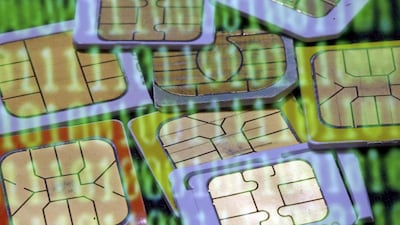It’s almost time to rejoice – the mobile phone racket is coming to end. Cheaper devices and services are coming soon, thanks to a new technology known as eSim.
But before we get to that, let’s discuss the racket itself. Don’t believe you’re overpaying for both your smartphone and monthly wireless service? OK, try this on for size.
Imagine if electricity companies also sold toasters. Maybe they’d offer that toaster at a “discount” in exchange for your agreeing to a long-term contract for electricity service.
The toaster manufacturers would get in on this too, since the high prices would mean higher profit margins.
That’s basically how the smartphone market works. Carriers offer “subsidies” on expensive devices in exchange for consumers signing on to one or two-year contracts.
Subscribers believe they’re getting a deal because the phone is cheaper upfront, but carriers charge higher monthly service prices to make up for the subsidies. Manufacturers, meanwhile, rake in hefty profits.
It's why you can buy a brand-new 4K television – sold on the open market at third-party retailers – for less than a new iPhone. Television manufacturers, as a result, typically make profit margins of about 10 or 15 per cent. Apple, which sets the bar for smartphone prices, has had its iPhone margin estimated at a comparatively astronomical 69 per cent.
That’s one expensive and immensely profitable toaster.
But this run for carriers and manufacturers is coming to an end now that just about everyone who wants a smartphone has one. And those who have them are hanging on to them for longer.
Device shipments grew by only 10 per cent last year, a major slowdown from 28 per cent the year before, according to Kleiner Perkins venture capitalist Mary Meeker’s often-cited annual Internet Trends Report. The further trend points nowhere but down.
The wireless industry is having to regroup and retool for this new reality. Enter eSims, or embedded Subscriber Identity Modules, set to start replacing regular Sim cards next year. Both chips house the information needed for a phone to connect to a wireless network. But embedded Sims, as their name implies, are not removable. A carrier’s network identification information is simply downloaded and written on to them.
The benefits are obvious. Customers will no longer have to go into a carrier's shop to pick up a new Sim card or wait for it to arrive in the mail. They'll simply open an app, see which networks are available and at what prices and instantly subscribe. With the ability to easily switch carriers, competition and lower prices are sure to follow.
That is bad news for wireless operators. As a recent Morgan Stanley report put it: “The shift puts three profit streams at risk: handset sales, roaming fees and earnings from price-conscious consumers who, under the new model, are more likely to price shop.”
Manufacturers are already gearing up for this new reality. Apple has been offering its own version of the eSim, the Apple Sim, in some iPad models for a while now. Industry watchers were expecting Apple Sims in this year’s iPhone, but now believe the company is saving them for the device’s big 10th anniversary next year. Along with the iPhone Upgrade Programme – a leasing system in the US, UK and China that lets customers rent new devices every year – the company is shifting away from the old, carrier-centric model of selling phones. As Morgan Stanley said, clever manufacturers such as Apple will be able to benefit from the new paradigm by further cutting wireless operators out of the process.
“It also makes it possible to build closer relationships with consumers, which could ultimately shorten upgrade cycles,” wrote Katy Huberty, a tech hardware and services analyst.
Carriers don’t necessarily have to lose out either, since they also have the opportunity to expand their businesses.
Embedded Sims are already starting to pop up in cars, such as Audi's A4 and Q7, giving passengers the ability to buy data for in-vehicle use. This week at the Gitex tech show in Dubai, Etisalat and the London-based eSim maker QuarkSe are demonstrating an electric car that uses eSim technology.
Further, eSims are showing up in wearables such as Samsung’s Gear S2 Classic smartwatch.
Progressive carriers will be able to shift to a volume model, where they are selling more data subscriptions for a variety of devices. Greedy and immutable carriers, on the other hand, will instead stick to the old ways of overcharging for phones and services.
Any bets on which consumers will choose?
Winner of the Week: Google
The search company is getting rave reviews for its Pixel smartphone, releasing in five countries today. Reviewers are praising the device, the first designed completely by Google in-house, for its camera and artificially intelligent Personal Assistant.
Loser of the Week: Peter Thiel
The billionaire and PayPal co-founder doubled down on his support of US presidential candidate Donald Trump with a US$1.25 million campaign donation. That earned him the ire of several fellow Silicon Valley luminaries.
Peter Nowak is a veteran technology writer and the author of Humans 3.0: The Upgrading of the Species
business@thenational.ae
Follow The National's Business section on Twitter

